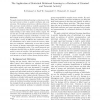Free Online Productivity Tools
i2Speak
i2Symbol
i2OCR
iTex2Img
iWeb2Print
iWeb2Shot
i2Type
iPdf2Split
iPdf2Merge
i2Bopomofo
i2Arabic
i2Style
i2Image
i2PDF
iLatex2Rtf
Sci2ools
130
click to vote
SDM
2010
SIAM
2010
SIAM
The Application of Statistical Relational Learning to a Database of Criminal and Terrorist Activity
We apply statistical relational learning to a database of criminal and terrorist activity to predict attributes and event outcomes. The database stems from a collection of news articles and court records which are carefully annotated with a variety of variables, including categorical and continuous fields. Manual analysis of this data can help inform decision makers seeking to curb violent activity within a region. We use this data to build relational models from historical data to predict attributes of groups, individuals, or events. Our first example involves predicting social network roles within a group under a variety of different data conditions. Collective classification can be used to boost the accuracy under data poor conditions. Additionally, we were able to predict the outcome of hostage negotiations using models trained on previous kidnapping events. The overall framework and techniques described here are flexible enough to be used to predict a variety of variables. Such p...
Related Content
| Added | 29 Oct 2010 |
| Updated | 29 Oct 2010 |
| Type | Conference |
| Year | 2010 |
| Where | SDM |
| Authors | B. Delaney, Andrew S. Fast, W. M. Campbell, C. J. Weinstein, David D. Jensen |
Comments (0)

